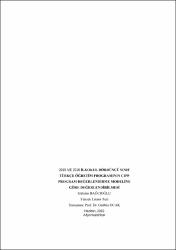2015 ve 2018ilkokul dördüncü sınıf türkçe dersi öğretim programının cıppprogram değerlendirme modeline göre değerlendirilmesi
Özet
Bu araştırma, 2015 ve 2018İlkokul Dördüncü Sınıf Türkçe Öğretim Programını CIPP program değerlendirme modeline göre değerlendirmeyi amaçlamıştır. Araştırmada betimsel araştırma yöntemleri arasında yer alan tarama modeli kullanılmıştır. Araştırmanın evrenini Afyonkarahisar’da çalışan 987 sınıf öğretmeni oluşturmaktadır. Araştırmanın örneklemini ise bu evrenden oransız küme örnekleme yöntemi ile seçilen 524 (2015 programı için 400, 2018 programı için 124) sınıf öğretmeni oluşturmuştur. Araştırmada veri toplama aracı olarak araştırmacı tarafından geliştirilen ve 31 maddeden oluşan İlkokul Dördüncü Sınıf Türkçe Öğretim Programını Değerlendirme Aracı kullanılmıştır. Ölçme aracının Cronbach Alfa güvenirlik katsayısı 0.90 olarak bulunmuştur. Araştırmaya katılan öğretmenlerinmaddelere verdikleri cevaplar değişkenlere göre Mann Whitney U ve Kruskal Wallis testi ileSpearman korelasyon analizi kullanılarak analiz edilmiştir.
Araştırmaya katılan sınıf öğretmenlerinin, 2015 ve 2018 ilkokul dördüncü sınıf Türkçe öğretim programının bağlam, girdi, süreç boyutunda yer alan tüm maddelere “katılıyorum” cevabını verdikleri görülmüştür. Araştırmaya dâhil olan öğretmenlerin 2015 Türkçe Öğretim Programı’nın ürün boyutunda yer alan maddelerden biri olan “öğrencilerin topluluk önünde konuşma becerisine yönelik gösterdiği gelişim tatmin edici değildir” ifadesine katılıyorum cevabını verdikleri ancak 2018 Türkçe Öğretim Programının değerlendirilmesinde fikir bildiren öğretmenlerin bu maddeye katılmadıkları görülmüştür.
2015 ve 2018 Türkçe Dersi Öğretim Programının bağlam, girdi ve süreç boyutlarında düşük düzeyde bir ilişki saptanırken ürün alt boyutunda ise anlamlı ve orta düzeyde bir ilişkinin olduğu tespit edilmiştir. The purpose of this study is to 2015 and 2018 evaluate the fourth grade primary school Turkish curriculum according to CIPP model.
In this study, survey method, one of the descriptive research method was used. The universe of this study consisted of 987 primary school teachers working in Afyonkarahisar. The sample consist of 524 primary school teachers (400 curriculum for 2015, 124 curriculum for 2018) chosen by disproportionate cluster sampling method. Data collection instrument was “Fourth Grade Primary School Turkish Curriculum Evaluation Scale”. The scale was developed by researcher and consists of 31items. Cronbach Alpha reliability coefficient was found 0.90. Primary school teachers’ responses were analyzed by using Mann Whitney U, Kruskal Wallis Tests and Spearman colaration analyze.
The primary teachers who participated in the study answered all the items included in the contex, input, process of the 2015 and 2018 fourth grade Turkish curriculum as “I agree”.The teachers participated in the study answered as “I agree” for the item of “the development of students' ability to speak in public is not satisfactory” in the product dimension of the 2015 Turkish Curriculum. However, it was seen that the teachers who expressed their opinions in the evaluation of the 2018 Turkish Curriculum indicated that they did not agree in this item.
The relationship between the sub-dimensions of the 2015 and 2018 Turkish course curriculum was examined. There was a low level relationship determined in the context, input, process dimensions and their sub-dimensions, however there was a significant and moderate relationship determined in the product sub-dimension.
Bağlantı
https://hdl.handle.net/11630/7268Koleksiyonlar
- Yüksek Lisans Tezleri [1671]



















